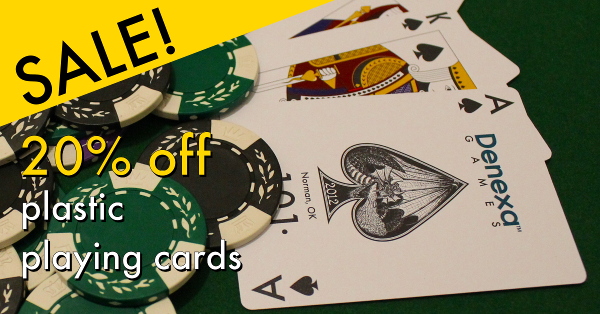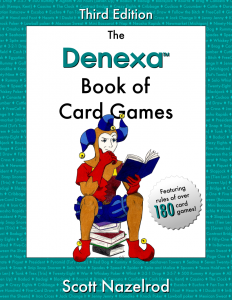Malilla
Malilla is a trick-taking game for four players in partnerships. Players vie to take tricks that contain aces, 7s, and face cards, as those are the only cards worth any points!
Malilla originated in Spain, where it is called Manilla, and most likely derives from an earlier French game called Manille. From Spain, it crossed the Atlantic to Mexico, where it remains popular today.
Object of Malilla
The object of Malilla is to be the first partnership to score 35 or more points. This is achieved by winning tricks containing aces, 7s, and face cards.
Setup
Malilla is traditionally played with a 40-card Spanish deck. Outside of Spain, however, it is commonly replicated using a subset of the standard 52-card deck. Starting from a deck of Denexa 100% Plastic Playing Cards, remove all the 10s, 9s, and 8s. This will yield a deck with ten cards in each of the four suits (aces, kings, queens, jacks, and 7s through 2s). You also need something to keep score with; pencil and paper works admirably.
Determine partnerships by whatever method is convenient, such as high-card draw or even just mutual agreement. Partners should sit opposite one another, with their opponents in between. The turn of play should alternate partnerships as it progresses clockwise around the table.
Shuffle and deal ten cards to each player. The first 39 cards should be dealt face down. The 40th and last card in the deck should be dealt face up to the dealer. This card indicates the trump suit for the hand. Once all players have seen it, the dealer can add it to their hand.
Card ranking
For the most part, the cards rank in their usual order in Malilla. However, the 7 is elevated to become the highest-ranking card, leading to a complete ranking of (high) 7, A, K, Q, J, 6, 5, 4, 3, 2 (low).
The card ranking influences the point values of each of the cards, as well. The 7 is also the most valuable card in the game. The point values of each card are:
- 7: five points.
- Ace: four points.
- King: three points.
- Queen: two points.
- Jack: one point.
- 6s through 2s: zero points.
Game play
If the dealer’s last (face-up) card is a point-scoring card, the dealer’s team scores that many points as a bonus. These points are, in most cases, scored immediately. The only exception to this is if the bonus would cause the dealer’s team to win the game. In that case, the bonus points are held in abeyance until the end of the hand, and are only scored after the results of the hand are scored.
Play of the hand
The player to the dealer’s left leads to the first trick. The other players, in turn, each contribute a card to the trick. When all four players have played, the person who contributed the highest trump, or the highest card of the suit led if no trump was played, wins the trick.
There are a few restrictions on what can be played to a trick. As in most trick-taking games, in Malilla, you must follow suit. If you cannot follow suit, you may play almost any card, including a trump. The exception is that you cannot play a 7 of a non-trump suit that has not yet been led in that hand. (In the rare case that this is the only card available to play, this rule is waived.) Also, if an opponent has played the card that is winning the trick as of your turn, you must beat it if it would be legal for you to do so.
Once a player has won a trick, they collect the cards and place them in a won-tricks pile shared with their partner. For ease of scoring later, it may be a good idea to keep the point-scoring cards in a separate pile than the non-scoring cards. The winner of each trick leads to the next one. (Note that it is always OK to lead a 7—the restriction on them only applies to playing them when not following suit.)
Scoring
After all ten tricks have been played, each partnership totals the value of the point-scoring cards they captured. Whichever partnership collected more points over the course of the hand wins it. They subtract their points collected from 35 and score the difference. If both partnerships tie, both collecting 35 points, neither partnership scores for that hand.
If a partnership captures all ten tricks, they will have collected 70 points, thereby scoring 35 points for the hand. This is sufficient to win the game, and is called a capote.
If neither side reaches a score of 35 after the hand is scored, then the deal passes to the left and new hands are dealt. Game play continues until one partnership ends the hand with a score of 35 or more. That partnership is the winner.
Irregularities
Malilla is unusually harsh on players who fail to play correctly. Any irregularity in dealing results in the errant dealer being forced to surrender the cards to the next dealer. If it is discovered that a player made an incorrect play to a trick, such as failing to follow suit when able, or not winning the trick when able, the partnership committing the foul loses the entire game.


